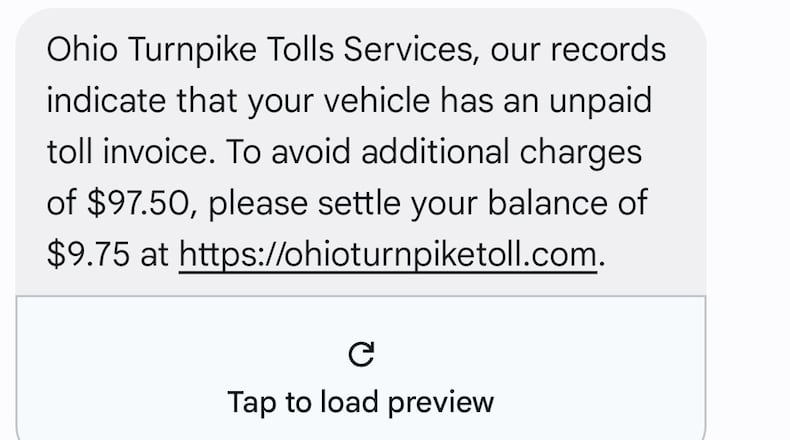The Ohio Turnpike does not request payment, collect tolls, or report violations from E-ZPass customers via text. Customers are notified of unpaid tolls via paper invoices via U.S. mail. Customers are also notified of account status, such as credit card or fund issues, through email, according to Ohio Turnpike communications director Charles Cyrill.
In a way, the fact that the Dayton area doesn’t have toll roads could make local residents more susceptible to the scam. People who live in Chicago or parts of northern Ohio near the Ohio Turnpike are more familiar with toll rules and payment processes. But Dayton area residents making a one-time trip to an area with tolls may be confused when they get “charged” after the fact.
The Ohio Turnpike and Infrastructure Commission refers to the scams as “smishing” or SMS Phishing, where fake texts are used to trick people into downloading malware or sending scammers money or personal information. They, along with toll agencies in neighboring states, first issued an alert about the scam in April of this year. They are warning customers again after a resurgence of scam texts.
Luckily, being aware of scam attempts can help prevent falling victim to them.
“It appears we are making some progress,” said Cyrill. “[Customers] are savvy to the scam, and they are thanking us for that.”
— Ohio Turnpike (@OhioTurnpike) July 23, 2024
Keep yourself safe from scam texts
To protect yourself from scam texts, the Federal Trade Commission suggests staying aware of common phishing tactics. Scam texts and emails might look legitimate at first, but they often have generic greetings and ask you to click on a link to update payment or personal information.
If you get an unexpected text message asking for personal information, don’t reply or click on any links. Links from scam text messages may try to automatically download malware to your device. According to the FTC, legitimate companies won’t ask you for payment or personal information over text.
Since the Ohio Turnpike never asks for payment via text, people who receive suspicious texts are encouraged to report them to the FBI’s Internet Crime Complaint Center, and include the phone number you got the text from in your complaint.
About the Author
